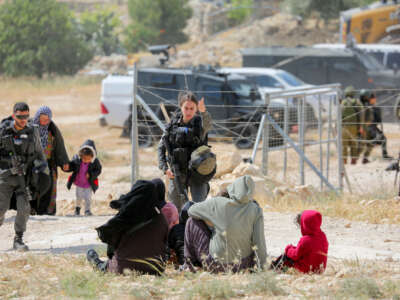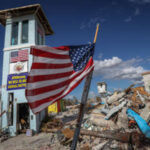Approximately one month ago — after years of harassment and intermittent demolitions — Israeli occupation forces arrived in the Palestinian village of Khallet al-Dabe’, one of the 12 communities that make up Masafer Yatta in the South Hebron Hills in the occupied West Bank. They proceeded to demolish the village almost entirely. In just two and a half hours, Israeli occupation forces reduced almost the entire village to rubble.
Like Khallet al-Dabe’, all of the Palestinian villages in Masafer Yatta are now under threat of permanent expulsion after the Civil Administration — the Israeli military body in charge of governing the West Bank — issued an order allowing what it calls “live-fire training” in Masafer Yatta, an action taken to reinforce its designation of the area as “Firing Zone 918.”
For more than fifty years, the people of this area have been impacted by this designation as their homes and land are destroyed to make way for the metastasizing Jewish-only Israeli settlements and outposts. Palestinians resist their expulsions, and until recently, we have had some chance of recourse through the Israeli military courts.
Stay in the loop
Never miss the news and analysis you care about.
This is no longer the case.
The new order from the Civil Administration gives a green light for the Israeli military to forcibly remove virtually all residents of Masafer Yatta under the pretext that they are using “Firing Zone 918” for military drills. Before this order, a village or two may have been given orders allowing its residents, at least on paper, to return to their homes. But now the opposite is happening: demolition orders are fast-tracked, and Palestinian building permit requests are being rejected wholesale — even retroactively.
This means that all the ownership papers and land rights are now, in the eyes of the court, null and void. These steps — backed by court approval — threaten to displace over 1,200 residents, including more than 500 children.
Dozens of existing homes, schools, water systems, and other infrastructure are at imminent risk of demolition, signaling the next step in the complete ethnic cleansing of the South Hebron Hills.
This chilling acceleration forces Palestinians in Masafer Yatta to face displacement without even the possibility of remedy. While the waves of bulldozing have been ongoing, this new development codifies the intent to spread new Jewish-only settler outposts on our lands. I am not alone in this plea; international human rights groups have warned that this orchestrated approach — dismantling Palestinian structures, resurrecting live-fire excuses, and expelling communities — is a calculated push under the lie of military necessity.
The Palestinians Who Refuse to Be Erased
On May 5, between 9:00 and 11:30 a.m., the Israeli army destroyed nine homes, six caves, ten water tanks, four animal barns, eleven toilet rooms, seven water wells, 400 meters of agricultural fencing, a community center, an electricity room, all solar panels, internet systems, and security cameras in Khallet al-Dabe’. Hyundai bulldozers and other machinery tore through the buildings as steel twisted and cement crumbled.
But the people of Khallet al-Dabe’ refused to be erased.
Despite the destruction and the suffocating summer heat, residents began to rebuild what they could using tents and salvaged materials. These makeshift shelters were more than physical structures — they were acts of resilience, resistance, and rootedness. They declared: We are staying. And although many of the demolished homes already had similar statements muralled on their sides, the people of the village will just paint again, as Sisyphean as it seems.
In response, settlers and soldiers continue to escalate their campaign of harassment and violence. Just two weeks after the demolition, settler militias attacked Suleiman al-Dababseh, a resident of the village. They beat him so severely that they fractured his skull and broke his arm. He was left bleeding in the dirt. With no immediate access to medical care, he endured more than an hour of agony before reaching a distant hospital, where he remained for three days. The settlers who attacked him were never arrested. This is the pattern, though never normal: violence without consequence.
Shortly afterward, settlers targeted a cave where Abdullah al-Dababseh had taken refuge with his family following the demolition of their home. Fearing for his children’s safety, Abdullah fled deeper into the village. Settlers quickly occupied the cave in his absence, installed a tent for their stolen livestock, and declared it a new outpost — an illegal, de facto extension of their presence.
Since the expulsion of two Palestinian families from their caves, settlers have been bringing herds of sheep, cattle, and camels into the fruit orchards and gardens of the destroyed homes in Khallet al-Dabe’. The animals are deliberately used to destroy the remaining trees. This tactic is part of a larger pattern: state forces demolish homes, and settlers — with impunity — invade, attack, steal, and establish outposts, all with the support of the Israeli military. This strategy of building settler “herding outposts” is being implemented in other parts of the West Bank.
The villagers, some close to 90 years old, are forced to stand by while groups of settlers invade gardens and what’s left of their homes with rifles. The fact that these elders were born in Khallet al-Dabe’, long before the establishment of the Zionist state — as were their parents and ancestors before them — does not stop the Israeli regime from issuing demolition orders and declaring that they must be expelled from their land.
From the stolen caves and occupied homes, settlers launch daily assaults. They march in broad daylight, block families inside, destroy crops and fruit trees, and trample any last source of sustenance. Even children are harassed on their way to school, chased through the hills, denied safety in classrooms, and in some cases, denied access to education altogether.
All of this happens in full view of Israeli occupation forces. They do nothing. In many cases, they assist, providing encouragement and legal immunity.
A known settler, nicknamed “Benny,” dressed in military greens, took leadership in these attacks and is known to issue commands to soldiers and police. He uses 24-hour expulsion orders to expel me and my friends, colleagues, and Israeli activists and internationals. Under his direction, two international women were arrested, taken to the Israeli authorities, and deported — permanently banned from returning.
He targeted me twice in the village of Khallet al-Dabe’ because he knows me as an activist and a journalist from the village of Tuwani, and because he arrested me twice on my land in the past few months.
On June 1, 2025, we, as activists from the region, alongside internationals and Israeli activists, achieved a small but significant victory: we dismantled the illegal settler outpost in Abdullah’s cave and forced the settlers to leave. But within hours, the Israeli military declared the area a “closed military zone,” barred Abdullah from returning, and stationed soldiers at the site.
The following day, June 2, international media teams arrived in Masafer Yatta to report on the destruction. Israeli forces blocked every entrance, closed roads, and sealed off entire villages. Journalists were denied access. The intent was clear: silence the truth and hide what is happening in Khallet al-Dabe’ and the other villages in my community.
Keep the press free. Fight political repression.
Truthout urgently appeals for your support. Under pressure from an array of McCarthyist anti-speech tactics, independent journalists at Truthout face new and mounting political repression.
We rely on your support to publish journalism from the frontlines of political movements. In fact, we’re almost entirely funded by readers like you. Please contribute a tax-deductible gift at this critical moment!
Read full article at source
Stay informed about this story by subscribing to our regular Newsletter


